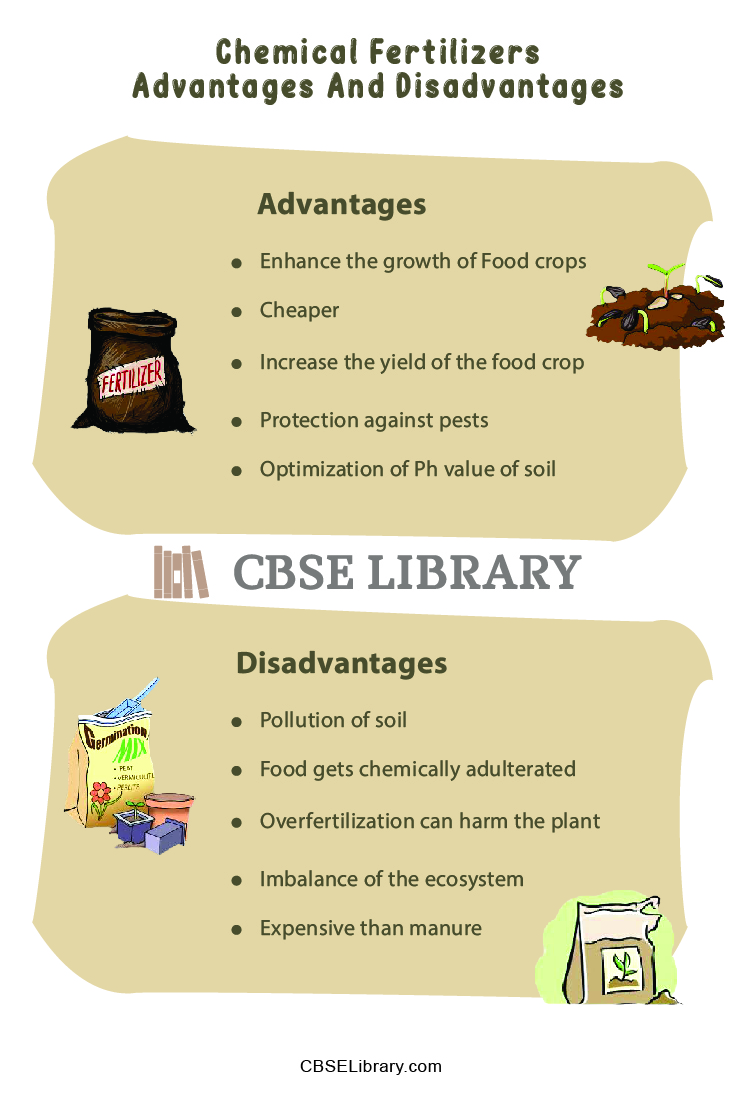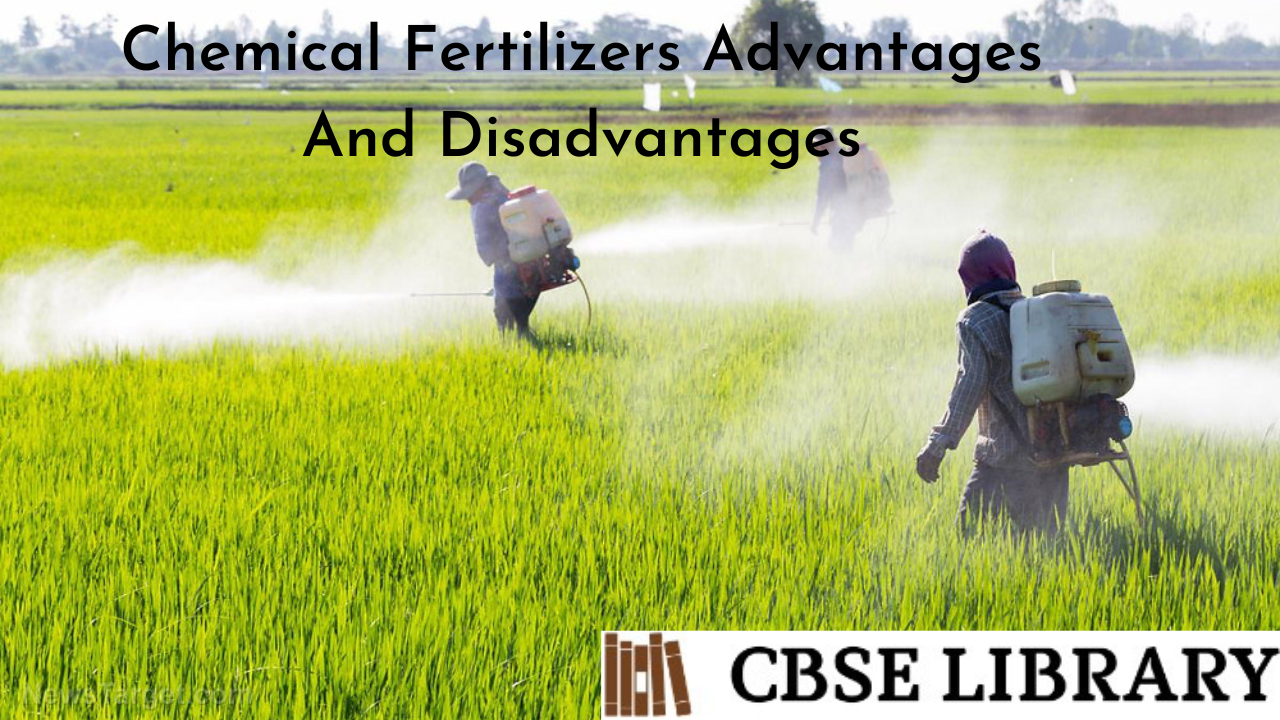Chemical Fertilizers Advantages And Disadvantages 2022: Our whole earth depends upon nature. Nature resembles the Plant, animals, landscapes, etc. Together all make a complete ecosystem. The most important one of them is Plants and trees which provide us not only oxygen but food and other utilities like wood, medicines, etc are obtained with a minimal cost. But plants to grow well and provide these things require a good amount of water supply and manures or fertilizers. These fertilizers can be organic or have chemical content. But due to these chemical fertilizers, the land and water get polluted also. Therefore one should efficiently use chemical fertilizers so that the environment may not get negative effects.
Students can also find more Advantages and Disadvantages articles on events, persons, sports, technology, and many more.
What are Chemical Fertilizers? Chemical Fertilizers Advantages And Disadvantages 2022
A chemical fertilizer is a nutrient provided to the plant whether natural or synthetic in the roots or plant tissue. The fertilizers have mostly compositions in a certain percentage of Nitrogen (N), Phosphorus (P), and Potassium (K). All these nutrients help in the growth of a plant. There are generally four types of chemical fertilizer they are:
- Nitrate fertilizer e.g.: sodium nitrate
- Amide fertilizers e.g.: Urea
- Ammonium fertilizers e.g.: Ammonium sulfate
- Nitrate and ammonium fertilizers e.g.:Ammonium sulfate
These fertilizers are prepared from water-soluble salt. And are artificial fertilizers manufactured in industries. Also, there are three main classes of fertilizers.
- Nitrate fertilizers
- Potassium fertilizers
- And phosphorus fertilizers.
Fertilizers are added by farmers so that they could produce enough yield for the ever-growing population. These chemical fertilizers help in the production of food crops in good quantities to meet the food demands of the population. These chemical fertilizers are available in solid as well as liquid forms.
Now let us see what are the Chemical Fertilizers Advantages And Disadvantages.
Advantages of Chemical Fertilizers
Let us briefly discuss the advantages of Chemical Fertilizers.
- Enhance the growth of Food crops: Chemical fertilizer has contents like nitrate, phosphorus, and potassium which help in the overall growth of the food crops. Therefore the crop will be fruitful for the farmers and will give a good yield. As all the nutrients have been provided to the crop for proper growth.
- Cheaper: Chemical fertilizers are way cheaper as the availability of different nutrients is abundant in our nature that making it simple for industries to produce fertilizer. Also, the government has taken steps to ensure that farmers should get these fertilizers at minimum cost so that buying them shall not be a burden for them.
- Increase the yield of the food crop: As the growth of the plant is ensured through chemical fertilizer this help in increasing the yield of the plant too. With a high yield, a farmer can earn high revenue therefore fertilizers are helping farmers to increase the yield.
- Protection against pests: Chemical fertilizers are considered to resolve the problem of pests as pests attack the farmer’s crop but due to the high level of nitrogen in fertilizer the pest resists attacking the plant.
- Multiple crops can be grown in fields: Chemical fertilizers help in the growth of the plant to a much extent thus growing more than one crop or rotating crop according to season become possible thus farmers can earn alternatively in the off-season too.
- Easy to transport and stock: Chemical fertilizers are available in solid or liquid form and also stored in a container thus it becomes easy for farmers to carry or transport fertilizers from one place to another and also store it if not in use instantly.
- Optimization of Ph value of soil: sometimes when alkalinity is increased in the soil chemical fertilizers help to make the Ph value of soil acidic so that farming could be practised smoothly.
- Help to survive poverty: Fertilizers are helpful to farmers often many farmers are considered poor. That poor section of farmers can combat poverty with the use of chemical fertilizers as it helps to yield more thus in return they may get revenue more.
Disadvantages of Chemical Fertilizers
Let us briefly understand the disadvantages of chemical fertilizers
- Pollution of soil: Chemical fertilizers always add to the pollution of soil as the chemicals used in fertilizers if increased to more than a limit may cause damage to the soil, therefore, leading to soil pollution its fertility is also decreased.
- Food gets chemically adulterated: The food produced by the plant which uses fertilizer for growing can absorb the chemical in the food and thus it becomes chemically adulterated.
- Chemicals can affect the microorganism in the soil: The chemical used in fertilizer not only pollutes the soil but also affects the microorganism present in the soil which helps in the growth of the plant by loosening the soil.
- Overfertilization can harm the plant: sometimes due to an overdose of chemical fertilizer the plant may get harmed as they may get infected by various diseases. The increase in the amount of nitrogen as compared to phosphorus will make things worse for the plant.
- Imbalance of the ecosystem: Since the soil fertility gets reduced the plant cannot grow well in such conditions, therefore, the living organism depending on the plant for food will reduce and in the same way, others dependent on herbivorous plants will be affected thus creating an imbalance in the ecosystem.
- Expensive than manure: Organic manure which is easily available through nature is much cheaper and more nutritious for plants as compared to expensive chemical fertilizers.
- Groundwater also gets polluted: As the fertilizers are highly soluble in water therefore they can leach away from plants to the underground water.
- Soil loses its fertility: The fertility of the soil is lost due to the heavy chemicals of fertilizers therefore after soil loses its fertility the plant would be unable to grow as it used to grow.

Comparison Table on Chemical Fertilizers Advantages And Disadvantages
Below is the comparison table for the Chemical Fertilizers Advantages And Disadvantages.
| Advantages of Chemical Fertilizers | Disadvantages of Chemical Fertilizers |
| Enhance the growth of food crops | Pollution of soil |
| Cheaper | Food gets chemically adulterated |
| Increase the yield of the food crop | Chemicals can affect the microorganism in the soil |
| Protection against pests | Overfertilization can harm the plant |
| Multiple crops can be grown in fields | Imbalance ecosystem |
| Easy to transport and stock | Expensive than manure |
| Optimization of Ph value of soil | Groundwater also gets polluted |
| Help to survive poverty | Soil loses its fertility |
FAQs on Pros and Cons of Chemical fertilizers
Question 1.
Which is the most common limitation of chemical fertilizer?
Answer:
Chemical fertilizers are more expensive as compared to natural fertilizers and they pollute the soil.
Question 2.
How long does the chemical fertilizer remain in the soil?
Answer:
Chemical fertilizers last for one to two weeks in the soil. They have to be reapplied for further growth of plants.
